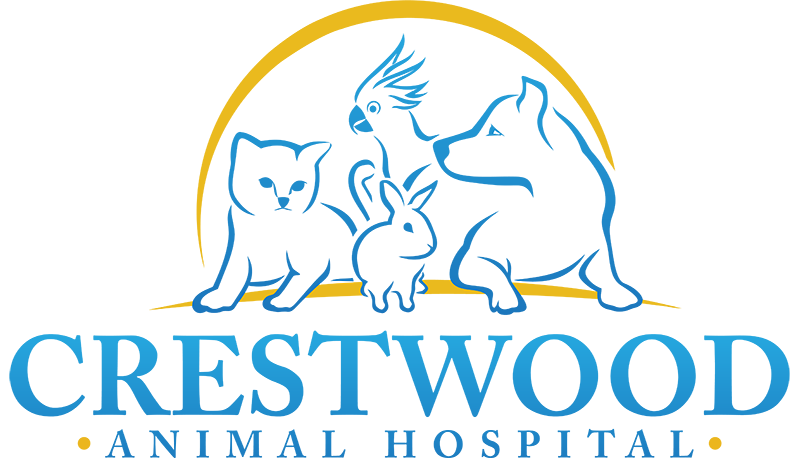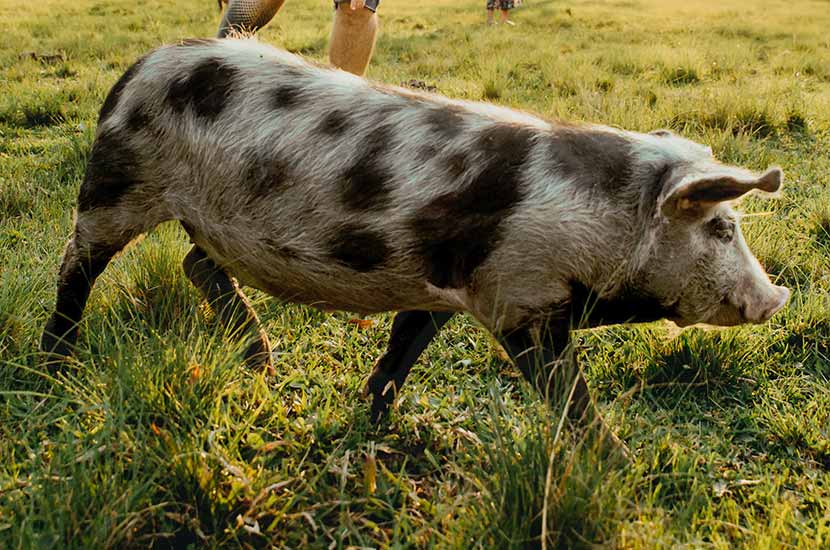Natural History
Pot bellied pigs are often called Vietnamese and Asian pot bellied pigs aptly named for their round appearance. These animals are a subspecies of the domestic farm pig and have several of the same characteristics, especially personality wise. Many folks have found that even the “teacup” and “micro mini” pigs are reaching adult sizes of 60-175 pounds and they mature between 3-5 years! This is completely normal but often the reason that rescues and sanctuaries are full of the pitter patter of little hooves.
A mature pig can become territorial and aggressive (which is decreased with neutering and spaying) as they try to establish dominance in the household. Setting up rules and boundaries and use of a firm “no!” will help establish the owner as “top pig”. The key to good training of these sensitive creatures is to be gentle but firm and always consistent. Never physically discipline pot bellied pigs. In the case of pigs, as with nearly all animals, praise and prevention are better training tools than aggressive discipline. Remember, don’t discipline for pigs destroying an item that was not put away properly.
These head strong, intelligent, playful, and affectionate animals live 12-20 years depending on breeding, diet, and overall health. Although pigs are demanding they have the added bonus of being relatively allergy free as well as clean! Pot bellied pigs have become infamous for learning how to open fridge doors, cabinet doors, run through doors when they hear the treat bag, and genuinely being inquisitive. It is highly recommended that pig proofing your home (similar to toddler, puppy, parrot, or ferret proofing) be started prior to your new pet having full range of the home! It is worth mentioning that pigs are not fond of being held especially when they become older. Their feet leaving the ground is unnatural for them and many start to panic.
Diet
Pot bellied pigs are omnivores and they are continuously hungry! Many owners have ended up with obese pigs because of their ability to beg for food. Typically, pigs fair best when fed twice a day. Depending on their age, size, activity and general health status pigs over a year old receive 1-1.5 cups of food each feeding. Pigs that lay around the house will be fed less than the ones that run around the yard rooting everything up. Piglets 6 weeks old up to a year old should be offered 2-2.5 cups of food due to the accelerated growth at this age. Remember, pigs will always beg and whine for more!
Suggested commercial diets:
- Mazuri
- Heartland
- Peak Performance
- Nutrina
- Manna Pro
Do not offer dog or cat food, these are not formulated for pot bellied pigs and often have too much protein and fat. A children’s chewable vitamin should be offered daily and can be used as a morning treat!
Foods to avoid:
Table scraps and human junk food. These are often high in fats, protein, and salt. Table scraps can also promote inappropriate begging behavior. Chocolate, as always is best not offered to pigs.
Fruit. These are often high in natural sugars and calories. A piece a day is fine but this should not be fed frequently. Pigs also do not do well with the acidity in citrus fruits
Corn and Potatoes. This is high starch, sugar, and carbs that pot bellied pigs don’t need. Domestic farm raised pigs are frequently fed corn to promote growth of fat.
Appropriate treats:
- Cheerios
- Unsalted and unbuttered popcorn
- Tiny pieces of cheese
- Commercially produced pig treats (watch the sugar content!)
Enclosures
Keeping pot bellied pigs in the house is hard, keeping them physically in the yard is harder as they love to root under fences. Their strong noses have been known to completely elevate fences in their determination to find food and larger pigs go right through them! Yards ideally should be enclosed with hog panels or cattle panels (easily purchased online or through farm stores such as Rural King and Farm and Fleet), cedar fencing or chain linked reinforced on the bottom with chicken wire. Regardless of the fencing material used, the fence will have to be set deeper into the ground than normal to avoid rooting the fence up!
All pigs should be offered an outdoor enclosure with a sturdy weatherproof shed area where they can escape bad weather and temperature extremes.
Substrate
Avoid using cedar chips and pine chips as the aromatic oils can be irritating the skin of pet bellied pigs as well as their respiratory tract. Blankets are a wonderful substrate for sleeping areas to help them feel cozy and like they were in a burrow. Pigs will shred and rearrange their blankets until they have it just right! For this reason, sleeping bags are not recommended and they also tend to cause overheating. Thicker blankets are a better option for the colder days. If the pig is going to be living outdoors, straw is an appropriate substrate and when piled high enough offers warmth as well.
Pigs that are being litter box trained should be offered newspaper as a substrate.
Temperature and Humidity
Pigs, in general, don’t sweat except for the very top end of their nose. Do not leave your pig unattended in areas over 76 degrees Fahrenheit! High humidity must be avoided especially during hot days.
Enrichment
Pigs become easily bored, especially when kept indoors and can become destructive in the home. Certain behaviors such as rooting are instinctual and can not be stopped but it can be redirected to a specified rooting area! If you are able to provide a spot in the yard of soft dirt this is best but a 2 x 2 foot frame can be created in the home that acts as a rooting box. Fill the frame like you would a toy box. Paper towel, newspaper and butcher paper can all be crinkled up or laid on top of the toys and treats (Cheerios and pig food are a favorite for this!) to simulate successful rooting outdoors. Hay is also an excellent addition and provides novel textures and scents. This alone will provide pigs with hours of entertainment!
Toys for pigs don’t have to be expensive or elaborate. Simple items like crumpled up newspaper, paper towel rolls with newspaper on either end holding in treats, and regular balls are a favorite of most pigs. Pigs will enjoy anything they can tear up, similar to a parrot.
Kiddy pools of clean water outdoors during spring and summer is vital for keeping pot bellied pigs healthy. Mud holes, if you can part with a section of lawn, are excellent for their skin and also to help cool them down. Pigs do not sweat and rely heavily on water and mud to cool their bodies.
Grooming
Pigs don’t require a ton of grooming up keep but there are several things owners must be aware of.
Grooming considerations include:
- Children’s Sunscreen. Pigs will burn in the sun same as a toddler. Always apply sunscreen especially to their back, ears, and the tops of their noses!
- Moisturizer Lotion. Pot bellied pig skin will dry out and crack if it is not properly moisturized. This is especially important after they were in water.
- Baths. They only need a once a month bath to remove any dirt and help keep the skin in top shape. An oatmeal based organic shampoo is best. Pig skin is very sensitive! Keep this in mind.
- Brushing. Pigs require daily brushing with a soft bristled brush.
- Hoof Trims. Pigs hate having their hooves trimmed and frequently scream as if they are being harmed. This is not a painful procedure.
- Tusk Trims. Tusks need to be trimmed to prevent overgrowth.
- Ear Cleaning. Their ears should be cleaned once a week.

